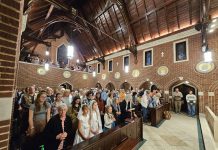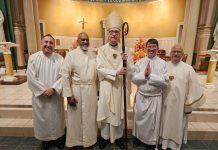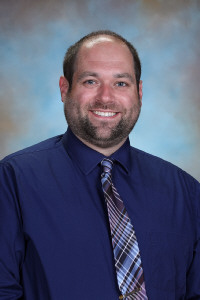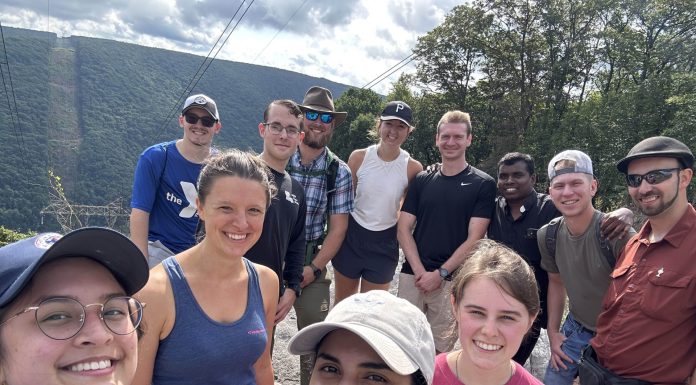Column by Jonathan Nagy
Following the death of his wife, Joy, in 1960, the great author C.S. Lewis was stricken with overwhelming grief. Under the pseudonym N.W. Clerk, Lewis wrote the book A Grief Observed in which he explored the nature of the human condition and the different emotions felt at key moments of life. He deliberated if one can return to normalcy in life after experiencing great grief. Lewis expressed his anger towards God after his wife’s death, unable to imagine living on without her. Eventually, Lewis revealed that the grieving process created a new truth for him. He began to experience gratitude for having experienced the gift of true love and thanked God for that gift.
Considered one of the greatest Christian authors of the last century, it may come as a surprise to many that Lewis felt moments of doubt in his faith in God, but he is not the first nor the last to express that emotion. In the Bible, Abraham, Moses, Zechariah, Thomas, and Paul doubted the power of God in their own situations, and yet, God never once doubted their abilities to carry out His work. Many saints had their own dark nights of the soul, which pushed their faith to the limits. Saint Terese of Lisieux, Saint Theresa of Avila, Saint Teresa of Calcutta, Saint Paul of the Cross, and Saint John of the Cross all experienced moments that tested their faith, creating doubt in their minds. In those ways, they are not much different than everyone else who has ever believed.
Eucharistic and healing miracles are well documented in the annals of the Catholic Church, occurring all over the world and at all times. In the early 2000s, Blessed Carlo Acutis assembled the largest documented collection of Eucharistic miracles from every part of the planet on a website before his death, allowing many to read and learn about God’s intercession through the Eucharist. Hundreds of cases of miraculous healings have been confirmed about those who have visited the waters in Lourdes, France since hearing of Saint Bernadette’s encounters with our Blessed Mother there in 1858. Miracles are such an important aspect of our faith that they are required for the canonization of saints. We continue to pray for miracles for our own Servant of God, Father Demetrius Gallitzin, which will happen in God’s time, not ours.
With the multitude of miracles that we may read about, one may question why these miracles are not happening to them. People wonder why God has not interceded in their life to heal them, fix a wrong, or show proof of His power and existence. In those ways, people mimic those Biblical and saintly heroes referenced earlier.
After encountering the Risen Christ, Saint Thomas’ doubts turned to belief, to which Jesus replied, “Blessed are those who have not seen me but still believe.” I contend that miracles happen in everyday life, and often are overlooked because of the simplicity of their nature. I confess that I am one of those individuals that goes looking for miracles from God, and I want to be prepared in case some unexplainable event happens. I want to experience them, as I am sure many others do, just as Thomas wanted to see the proof of the Resurrection with his own two eyes. However, I believe that we can learn a few lessons from Thomas.
Saint Thomas actually knew Jesus in the human form and witnessed first-hand the miracles that He performed. So, while I would be just as shocked if I heard that a loved one who died was alive again, it is difficult to imagine Thomas would have ever doubted the magnitude of what He could do. However, we all at times can be ‘Doubting Thomases.’ An overlooked miracle in our daily lives is the True Presence of Jesus in the Blessed Sacrament. We have what Thomas did not believe; we have Jesus with us at all times, and yet many do not believe in that miracle. We must have faith in believing that Jesus is present, whether we can see His human form or not. As humans, we are restricted by the limitations of our minds and have a difficult time believing what we do not see with our own eyes. Believing in the True Presence is a miracle in our own lives, and a miracle that exists every day.
We want to relive over and over again the good moments we experience. We love to tell each other stories of great happiness, joy, and triumph. When something wonderful and unexplainable happens, we want to tell everyone, because the truth with miracles is that once we experience one, we want more of them. Why then as Catholics are so many not able to express that feeling after experiencing the miracle presence of Jesus at Mass? It would be so refreshingly beautiful to hear someone say, “The greatest thing happened to me today. I met Jesus at Mass.” It would be even more refreshingly beautiful if they came back every day and said the same thing, and became a wonderful inspiration to others.
We like to boast about split-second interactions with celebrities. We try to snap a blurry selfie or get a hastily written autograph, providing the proof so desperately sought in order to tell the stories to others. However, that celebrity doesn’t know us at all, and yet individuals fawn over that brief moment. We want to say, “I met so and so,” or “They looked directly at me.” It is a moment of pride and astonishment that we were able to have a fleeting moment with another, well, human.
How is it then that the One who knows each of us by name, who has numbered the hairs on our head, is often the least talked about individual in our lives? He is someone who needs to be talked about, needs to be celebrated, needs to be shared! For those who want proof, they should not have to look any further than how we live out our faith in our lives. God has tasked us with being Him to others, for that is the true essence of Christianity. We need to refocus our priorities and who we see as important. How refreshing it would be to hear someone say, “I met Jesus through you.”
God is not only miraculously present in the Eucharist. He is present in those we encounter every single day. In another chapter of A Grief Observed, C.S. Lewis wrote, “We may ignore, but we can nowhere evade, the presence of God. The world is crowded with Him. He walks everywhere incognito. And the incognito is not always hard to penetrate. The real labor is to remember, to attend.” God is at work in those we encounter every day.
People like to say that sometimes things happen “out of coincidence.” I do not believe that, for everything is in God’s plan. There are popular sayings such as “God-incidences” or “God winks” that are used to describe these times in life when something good happens and is unexplainable. We should not overlook these moments. Several unexplained incidences have happened in my life, many of which had no particular significance until I had time to look back and reflect. God was at work “incognito,” as Lewis exclaimed. He is placing these “mini-miracles” in our lives to show us that He loves and knows us.
Many question how to convert others to believing in Jesus Christ. The truth is actually pretty simple. Be like Him. By far not an easy task, but God has provided us with all of the tools we need to do so. Our Church, our faith, our spiritual leaders are all there to help us put on the armor of God. We can and should be that miracle to others. We should be the people that lead others to Jesus. We all should want to hear that individuals met Jesus through us. The more that we prioritize Jesus in our lives, the more we can transform this world. In Luke, 12:49, Jesus said, “I have come to set the world on fire and how I wish it were already ablaze!” This world needs to be blazing when He comes again in glory! Meeting
Jesus is the best interpersonal interaction one could experience, and it can happen daily through the Eucharist. That is one celebrity encounter story I will never tire of hearing!
Saint Teresa of Avila, when reflecting upon her journey through the dark night of her soul, wrote, “All the trials we endure cannot be compared to these interior battles.” She is absolutely correct. No physical trial will ever cause us more suffering than our own internal struggles. Doubts are real. Doubts happen. However, faith in the everlasting power of Jesus Christ can get us through anything. Look to Him in the Sacraments, in His Church, and in His people. I end with the prayer often used at the close of Benediction. “May the Heart of Jesus, in the Most Blessed Sacrament, be praised, adored, and loved with grateful affection, at every moment, in all the Tabernacles of the world, even until the end of time.” Believe in the miracle of His presence, and you will never doubt again!
Jonathan Nagy, M.Ed., is the Dean of Students and Social Studies teacher at Bishop Carroll Catholic High School in Ebensburg. He is also the Music Director at the Basilica of Saint Michael the Archangel in Loretto.






























